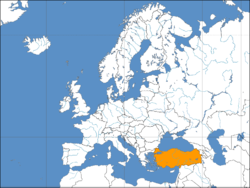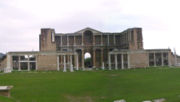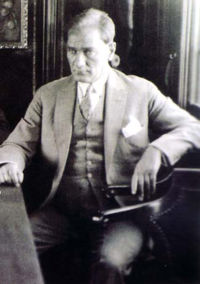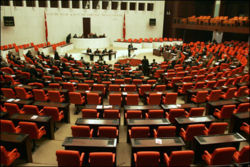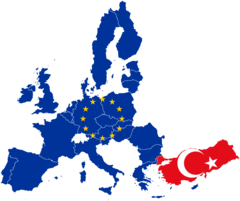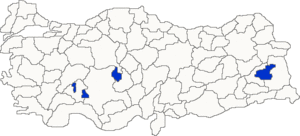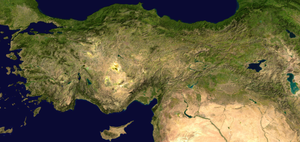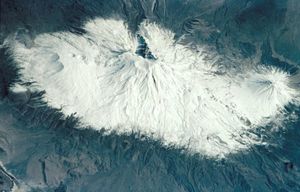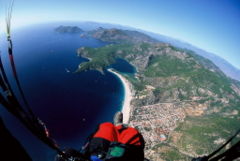Turkey
2007 Schools Wikipedia Selection. Related subjects: Countries; European Countries
| Türkiye Cumhuriyeti Republic of Turkey |
|||||
|
|||||
| Motto: Turkish: Yurtta Sulh, Cihanda Sulh (English: "Peace at Home, Peace in the World") |
|||||
| Anthem: İstiklâl Marşı (English: "Independence March") |
|||||
| Capital | Ankara |
||||
|---|---|---|---|---|---|
| Largest city | İstanbul | ||||
| Official languages | Turkish (Türkçe) | ||||
| Government | Republic | ||||
| - Founder | Mustafa Kemal Atatürk | ||||
| - President of the Republic | Ahmet Necdet Sezer | ||||
| - Prime Minister | Recep Tayyip Erdoğan | ||||
| Formation | |||||
| - Ottoman Empire | 1299 | ||||
| - Dissolution of the Ottoman Empire | 1908– 1922 | ||||
| - Formation of Parliament | 23 April 1920 | ||||
| - Start of War of Independence | 19 May 1919 | ||||
| - Victory Day | 30 August 1922 | ||||
| - Declaration of Republic | 29 October 1923 | ||||
| Area | |||||
| - Total | 783,562 km² ( 37th) 302,534 sq mi |
||||
| - Water (%) | 1.3 | ||||
| Population | |||||
| - 2005 estimate | 73,193,000 ( 17th1) | ||||
| - 2000 census | 67,844,903 | ||||
| - Density | 93/km² ( 102nd1) 241/sq mi |
||||
| GDP ( PPP) | 2006 estimate | ||||
| - Total | $612.3 billion ( 17th) | ||||
| - Per capita | $8,385 ( 75th) | ||||
| HDI (2003) | 0.750 (medium) ( 94th) | ||||
| Currency | New Turkish Lira2 ( TRY) |
||||
| Time zone | EET ( UTC+2) | ||||
| - Summer ( DST) | EEST ( UTC+3) | ||||
| Internet TLD | .tr | ||||
| Calling code | +90 | ||||
| 1 Population and population density rankings based on 2005 figures. 2 The New Turkish Lira (Yeni Türk Lirası) replaced the old Turkish Lira on 1 January 2005. |
|||||
Turkey ( Turkish: Türkiye), officially the Republic of Turkey ( Türkiye Cumhuriyeti ), is a Eurasian country that stretches across the Anatolian peninsula in Southwestern Asia and the Balkan region of Southeastern Europe. Turkey borders eight countries: Bulgaria to the northwest; Greece to the west; Georgia to the northeast; Armenia, Iran and the Nakhichevan exclave of Azerbaijan to the east; and Iraq and Syria to the southeast. In addition, it borders the Black Sea to the north; the Aegean Sea and the Sea of Marmara to the west; and the Mediterranean Sea to the south.
Turkey is a democratic, secular, constitutional republic whose political system was established in 1923 after the fall of the Ottoman Empire under the leadership of Mustafa Kemal Atatürk. It is a founding member of the United Nations, the OIC, the OECD and the OSCE, a member state of the Council of Europe since 1949 and of the NATO since 1952, and is currently in accession negotiations with the European Union, being an associate member since 1964..
Due to its strategic location straddling Europe and Asia, Turkey has been a historical crossroad between eastern and western cultures.
Etymology
The Turkish name for Turkey, Türkiye, subdivides into two words: Türk, meaning "strong" in Old Turkish and usually signifying the habitants of Turkey or a member of the Turkish nation; and the possessive suffix -iye, which means "owner" or "related to". The term "Türk" or "Türük" was first used as an autonym by the Göktürks (Sky Turks).
History
| War of Independence | Single Party Period | Multi-Party Period | Timeline | Atatürk | |||||||||
The region comprising modern Turkey is one of the oldest continually inhabited regions in the world, because of its strategic location at the intersection of Asia and Europe. The earliest Neolithic settlements such as Çatalhöyük (Pottery Neolithic), Çayönü ( Pre-Pottery Neolithic A to pottery Neolithic), Nevali Cori ( Pre-Pottery Neolithic B), Hacilar (Pottery Neolithic), Göbekli Tepe ( Pre-Pottery Neolithic A) and Mersin are considered as the earliest human settlements in the world. The settlement of Troy starts in the Neolithic and continues forward into the Iron Age. Through recorded history, Anatolians have spoken Indo-European, Semitic and Kartvelian languages, as well as many languages of uncertain affiliation. In fact, given the antiquity of the Indo-European Hittite and Luwian languages, some scholars have proposed Anatolia as the hypothetical centre from which the Indo-European languages have radiated. Other authors have proposed an Anatolian origin for the Etruscans of ancient Italy.
The first major empire in the area was that of the Hittites, from the 18th through the 13th century BC. Subsequently, the Phrygians, an Indo-European people, achieved ascendancy until their kingdom was destroyed by the Cimmerians in the 7th century BC. The most powerful of Phrygia's successor states was Lydia, Caria and Lycia. The Lydians and Lycians spoke languages that were fundamentally Indo-European, but both languages had acquired non-Indo-European elements prior to the Hittite and Hellenic periods.
Coastal Anatolia ( Ionia) meanwhile was settled by Greeks. The entire area was overrun by the Persians during the 6th and 5th centuries and fell to Alexander the Great in 334 BC. Anatolia was subsequently divided into a number of small Hellenistic kingdoms (including Bithynia, Cappadocia, Pergamum, and Pontus), all of which had succumbed to Rome by the mid-1st century BC. In AD 324 the Roman emperor Constantine I chose Constantinople, now Istanbul, as the capital of the Roman Empire. It subsequently became the capital of the Eastern Roman or Byzantine Empire.
The House of Seljuk was a branch of the Kinik Oghuz Turks who in the 9th century lived on the periphery of the Muslim world, north of the Caspian and Aral sea in their Yabghu Khaganate of the Oghuz confederacy. In the 10th century the Seljuks migrated from their ancestral homelands into the eastern Anatolian regions which had been an area of settlement for Oğuz Turkic tribes since the end of first millenium. The gradual conquest of Anatolia from the Byzantines by Turkic peoples, under the Seljuks with the Battle of Manzikert and the rise of the Seljuk Empire in the 11th century was finalized by the rise of the Ottoman Empire. Mass conversions to Islam by native Anatolians and peoples of the newly acquired lands helped creating a Muslim identity rather than a Turkic identity in the Empire.
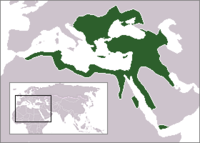
The Ottoman Empire interacted with both Eastern and Western cultures throughout its 631-year history. In the 16th and 17th centuries, the Ottoman Empire was among the world's most powerful political entities, often locking horns with the powers of eastern Europe in its steady advance through the Balkans and the southern part of the Polish-Lithuanian Commonwealth. Following years of decline, the Ottoman Empire entered World War I in through Ottoman-German Alliance in 1914, in which it was ultimately defeated. After the war, the victorious Allied Powers sought the partitioning of the Ottoman Empire through the Treaty of Sèvres.
On 19 May 1919 this prompted the beginning of establishment of the Turkish national movement under the leadership Mustafa Kemal Pasha, a military commander who had distinguished himself in the Battle of Gallipoli. Turkish national movement sought to revoke the terms of the treaty signed by the Sultan in Istanbul. This involved mobilizing every available part of Turkish society in what would become the Turkish War of Independence (Turkish: Kurtuluş Savaşı). By 18 September 1922 the occupying armies were repelled and the country saw the birth of a Turkish state. On 1 November 1922 the Turkish Grand National Assembly formally abolished the office of the Sultan, ending 631 years of Ottoman rule. The Treaty of Lausanne of 1923 led to the international recognization of the sovereignty of the newly formed "Republic of Turkey".
In the coming years Atatürk's reforms changed the landscape of the country, Kemal Pasha became the Republic's first President and instituted with the aim of modernizing the new Republic from the remnants of its Ottoman past. According to the Law on Family Names, the Turkish Grand Assembly presented Mustafa Kemal with the honorific name "Atatürk" (meaning Father of the Turks) in 1934.
Turkey entered World War II on the Allied side in the latter stages of the war as a ceremonial gesture and became a charter member of the United Nations. Difficulties faced by Greece after World War II in quelling a communist rebellion and demands by the Soviet Union for military bases in the Turkish Straits prompted the United States to declare the Truman Doctrine in 1947. The doctrine enunciated American intentions to guarantee the security of Turkey and Greece and resulted in large scale U.S. military and economic support.
After participating with United Nations forces in the Korean conflict, Turkey in 1952 joined the North Atlantic Treaty Organization (NATO). Turkey intervened and militarily invaded Cyprus in July 1974 in response to a Greek Cypriot coup by EOKA-B. The resultant breakaway de-facto independent Turkish Republic of Northern Cyprus is not officially recognised by any country except Turkey itself. Reunification of Cyprus failed despite acceptance by the Turkish Cypriots on a referendum of the UN sponsored Annan plan due to the rejection of the same by the southern Cypriot Greek community, later also resulting in failure of the E.U. and U.S. fulfilling their promises of lifting restrictions on the Turkish Cypriots in the northern section.
Turkey experienced a series of coups: Coup of 60, Coup by Memorandum, Coup of 80 and the Postmodern Coup D'etat. The period of the 70s ( Left-Right clashes) and 80s was marked by political instability and rapid, but at times erratic economic growth. A series of economic shocks led to new elections in 2002, bringing into power the conservative Justice and Development Party (AKP) led by the former mayor of Istanbul, Recep Tayyip Erdoğan. In October 2005, the European Union opened accession negotiations with Ankara and thus Turkey is a candidate country to join the European Union as a full member, having been an associate member since 1964.
Government and politics
The politics of Turkey takes place within a framework of a parliamentary representative democratic republic, in which the Prime Minister of Turkey is the head of government, and of a pluriform multi-party system. Executive power is exercised by the government. Legislative power is vested in both the government and the Grand National Assembly of Turkey. The Judiciary is independent of the executive and the legislature.
The function of Head of State is performed by the President of the Republic (Cumhurbaşkanı). A president is elected every seven years by the Grand National Assembly but is not required to be a member of parliament. The current President Ahmet Necdet Sezer was elected on May 16, 2000. Executive power rests in the Prime Minister (Başbakan) and the Council of Ministers (Bakanlar Kurulu) who make up the government. Neither the Prime Minister nor the Ministers have to be members of Parliament; though in most cases they are (one notable exception was Kemal Derviş, who was the Minister of Finance following the financial crisis of 2001; he is currently the head of the UN Development Fund). The Prime Minister is elected by parliament through a vote of confidence in his government, and he is generally the head of the party that has won the elections. The current Prime Minister is Recep Tayyip Erdoğan, whose Islamic conservative AKP won an absolute majority of parliamentary seats in the 2002 general elections. The President of the parliament is Bülent Arınç, also from the same party. Legislative power is invested in the 550-seat Grand National Assembly of Turkey (Türkiye Büyük Millet Meclisi) that represents the Turkish Nation. Its members are elected for a five year term by mitigated proportional representation with a national election threshold of 10%. There are 85 electoral districts that represent the 81 administrative provinces of Turkey (Istanbul is divided into three electoral districts whereas Ankara and Izmir are divided into two each because of their large populations). To avoid a hung parliament and its excessive political fragmentation, only parties that win at least 10% of the national vote in a national parliamentary election gain the right to parliamentary representation. Independent candidates may run, and to be elected, they must only win 10% of the vote in the district they are running from. Political parties deemed anti-secular or separatist by the Constitutional Court can have their public financing and activities suspended or its existence banned altogether. Turkey has a multi-party system, with several well-established parties, ranging from the far-left to the far-right.
The Armed forces have traditionally been a politically powerful institution, considered as the guardians of Atatürk's Republic. The protection of the Turkish Constitution and the unity of the country is by law given to the Turkish Armed Forces that therefore plays a formal political role via the National Security Council in the same functional way that exists also in other western democracies, as the guardian of the secular, unitary nature of the republic and reforms of Atatürk in the Turkish example. They have staged three coups between 1960 and 1980, whilst also influencing the removal of the Islam-oriented government of Necmettin Erbakan in 1997. Through the National Security Council (Milli Guvenlik Kurulu), the army contributes to recommendations for defense policy against any threat to the country, including those relating to any ethnic or religious separatism. In recent years, reforms have seen an increased civilian presence on the National Security Council and efforts to defunct military's constitutional responsibilities under the program of compliance with the EU demands. Despite its perceived alleged influence in civilian affairs, the military owns strong unequivocal support from the nation, and is considered to be Turkey's most trusted institution.
Foreign Relations
Turkey's main political, economic and military relations remain rooted within Western Europe and the United States. An associate member of the European Union since 1964, Turkey is currently in the process of accession pending the completion of negotiations started on October 3, 2005. A major stumbling block in its EU candidacy is the issue of Cyprus, a EU member that Turkey does not recognise, instead supporting the de facto independent Turkish Republic of Northern Cyprus. Other such unresolved issues include Turkey's human rights record, its relatively large population and its relatively poor but rapidly growing economy. Based on what it views as lukewarm support for its accession to the EU and alleged double standards in its negotiations (France and Austria have indicated they will hold referendums on Turkey's membership), the Turkish public has become increasingly euroskeptic in recent times. A mid- 2006 Eurobarometer survey revealed that 43% of Turkish citizens view the EU positively; just 35% trust the EU, 45% support enlargement and just 29% support an EU constitution. It is believed that the accession process would take at least 15 years . The earliest date that Turkey could enter the EU is 2013, the date when the next six-year EU budget will come into force (2013-2019).
Turkey has remained a close ally of the United States, supporting it in the war on terror in the post September 11th climate. However, the Iraq war faced strong domestic opposition in Turkey and as such, the Turkish parliament voted against allowing US troops to attack Iraq from its south-eastern border. This led to a period of cooling in relations, but soon regained momentum through diplomatic, humanitarian and indirect military support. Turkey is particularly cautious about an independent Kurdish state arising from a destabilised Iraq. Turkey has fought an insurgent war against the Kurdistan Workers Party (or PKK, which is listed internationally as a terrorist organization by a number of states and organisations, including the USA and the EU), that asserts to seek Kurdish independence, in which some estimated 30,000 people have lost their lives. This has led Ankara to pressure the US into clamping down on insurgent training camps in northern Iraq, though it remains reluctant due to its relative stability compared to the rest of Iraq. Turkey must therefore balance domestic pressures with commitments to its strongest ally.
Historically, relations with neighbouring Greece have been strained and occasionally close to war. The long divided island of Cyprus as well as conflicts on Aegean Sea remain the main sticking points between the two states. Cyprus remains divided between a Greek Cypriot south, and a Turkish Cypriot north recognized only by Turkey. Efforts to reunite the island under the auspices of the United Nations have failed thus far. As far as the Aegean Sea is concerned, Ankara considers it strategically important for easy passage of Turkish vessels, and as such does not recognise the extension of Greek territorial waters to 12-mile around the islands of the Aegean. Turkey has warned that such an act would be considered a casus belli or an act of war on Turkey. Nonetheless, following consecutive earthquakes in both Turkey and Greece and the prompt response of aid and rescue teams from both sides, the two nations have entered a much more positive period of relations, with Greece actively supporting Turkey's candidacy to enter the European Union. A clear sign of improved relations was visible in the response to a mid air collision by Greek and Turkish fighter jets in the southern Aegean in May 2006. While the Turkish pilot ejected safely, the Greek pilot lost his life. Both countries agreed that the event should not affect their bilateral relations . Recently, Greek military vessels throwing illegal immigrants into Turkish territorial waters led to official protests by the Turkish government.
Military
The Turkish Armed Forces ( Turkish: Türk Silahlı Kuvvetleri or abbreviated as TSK) consists of the Army, the Navy and the Air Force. The Gendarmerie and the Coast Guard operate as parts of the Ministry of Internal Affairs in peacetime. They are subordinated to the Army and Navy Commands respectively in wartime, during which they both have law enforcement and military functions.
The Turkish Armed forces, with a combined strength of 1,043,550 uniformed personnel, is the second largest standing armed force in NATO, after the United States of America. The Turkish Armed Forces became a member of the NATO Alliance on February 18, 1952. Currently, 36,000 troops are stationed in Turkish Republic of Northern Cyprus. Every fit, heterosexual male citizen (homosexuals are not allowed to serve in the Turkish Army) is required to serve in the military for time periods ranging from one to fifteen months, depending on his education and job location.
In 1998, Turkey announced a modernization programme worth some $31 billion over a period of ten years including tanks, helicopters and assault rifles. Turkey is also a level three contributor to the Joint Strike Fighter (JSF) program, gaining an opportunity to develop and influence the creation of the next generation fighter spearheaded by the United States.
The Turkish Army has contributed to a number of peacekeeping missions in Somalia, Albania, Bosnia, Kosovo and Afghanistan, provided logistics and military support to the coalition forces during both Gulf wars and maintains special forces units in Northern Iraq. In 2006 the Turkish parliament deployed a Turkish peacekeeping force of Navy patrol vessels and around 700 ground troops as part of an expanded United Nations Interim Force in Lebanon ( UNIFIL) in wake of the 2006 Israeli-Lebanon conflict.
The Commander of The Turkish Armed Forces is The Chief of the General Staff General Yaşar Büyükanıt who succeeded General Hilmi Özkök on August 30, 2006. The President, as the Head of State, is the Commander in Chief, in times of peace. The Chief of the General Staff becomes the Commander in Chief, on behalf of the President, in times of war.
Administrative divisions
Provinces and districts
Turkey is subdivided into 81 provinces (iller in Turkish; singular il). Each province is divided into districts (ilçeler; singular ilçe). The province usually bears the same name as the provincial capital, also called the central district; exceptions are Hatay (capital: Antakya), Kocaeli (capital: İzmit) and Sakarya (capital: Adapazarı). Major provinces include: İstanbul 11 million, Ankara 4 million, İzmir 3.5 million, Bursa 2.1 million, Konya 2.2 million, Adana 1.8 million. The provinces are also organized into 7 census-defined regions.
See also:
- Districts of Turkey
- Regions of Turkey
Cities
The capital city of Turkey is Ankara, but the historic capital İstanbul remains the financial, economic and cultural centre of the country. Other important cities include İzmir, Bursa, Adana, Trabzon, Malatya, Gaziantep, Erzurum, Kayseri, İzmit (Kocaeli), Konya, Mersin, Eskişehir, Diyarbakır, Antalya and Samsun. An estimated 68% of Turkey's population live in urban centers. In all, 12 cities have populations exceeding 500,000 and 48 cities have more than 100,000 people.
Major Cities :
- Note: Population figures given are according to the 2000 census
- İstanbul - 10,041,000
- Ankara - 4,319,000
- İzmir - 2,409,000
- Bursa - 1,195,000
- Adana - 1,131,000
- Gaziantep - 854,000
- Konya - 743,000
- Antalya - 603,000
Geography
The territory of Turkey extends from 36° to 42° N and from 26° to 45° E in Eurasia. It is roughly rectangular in shape and is 1,660 kilometers (1,031 mi) wide. Turkey's area inclusive of lakes is 814,578 square kilometres (314,510 sq mi), of which 790,200 square kilometres (305,098 sq mi) occupies the Anatolian peninsula (also called Asia Minor) in Western Asia, and 3% or 24,378 square kilometres (9,412 sq mi) are located in Europe. Many geographers consider Turkey politically in Europe , although it is rather a transcontinental country between Asia and Europe. The land borders of Turkey total 2,573 kilometres (1,599 mi), and the coastlines (including islands) total another 8,333 kilometres (5,178 mi). Turkey's size makes it the world's 37th-largest country (after Mozambique). It is comparable in size to Chile, and is somewhat larger than the US state of Texas.
Turkey is generally divided into seven regions: the Marmara, the Aegean, the Mediterranean, Central Anatolia, East Anatolia, Southeast Anatolia and the Black Sea region. The uneven north Anatolian terrain running along the Black Sea resembles a long, narrow belt. This region comprises approximately 1/6 of Turkey's total land area. As a general trend, the inland Anatolian plateau becomes increasingly rugged as it progresses eastward
Turkey forms a bridge between Europe and Asia, with the division between the two running from the Black Sea (Karadeniz) to the north down along the Bosporus (İstanbul Boğazı) strait through the Sea of Marmara (Marmara Denizi) and the Dardanelles (Çanakkale Boğazı) strait to the Aegean Sea (Ege Denizi) and the larger Mediterranean Sea (Akdeniz) to the south. The Anatolian peninsula or Anatolia (Anadolu) consists of a high central plateau with narrow coastal plains, in between the Köroğlu and East-Black Sea mountain range to the north and the Taurus Mountains (Toros Dağları) to the south. To the east is found a more mountainous landscape, home to the sources of rivers such as the Euphrates (Fırat), Tigris (Dicle) and the Araks (Aras), as well as Lake Van (Van Gölü) and Mount Ararat (Ağrı Dağı), Turkey's highest point at 5,137 metres (16,853 ft).
Turkey's varied landscapes are the product of complex earth movements that have shaped the region over thousands of years and still manifest themselves in fairly frequent earthquakes and occasional volcanic eruptions. The Bosporus and the Dardanelles owe their existence to the fault lines running through Turkey, leading to the creation of the Black Sea. There is an earthquake fault line across the north of the country from west to east.
The climate is a Mediterranean temperate climate, with hot, dry summers and mild, wet and cold winters, though conditions can be much harsher in the more arid interior. Mountains close to the coast prevent Mediterranean influences from extending inland, giving the interior of Turkey a continental climate with distinct seasons. The central Anatolian Plateau is much more subject to extremes than are the coastal areas. Winters on the plateau are especially severe. Temperatures of -30°C to -40°C can occur in the mountainous areas in the east, and snow may lie on the ground 120 days of the year. In the west, winter temperatures average below 1°C. Summers are hot and dry, with temperatures above 30°C. Annual precipitation averages about 400 millimeters, with actual amounts determined by elevation. The driest regions are the Konya plain and the Malatya plain, where annual rainfall frequently is less than 300 millimeters. May is generally the wettest month and July and August, the driest.
Economy
Turkey's economy is a complex mix of modern industry and commerce along with a traditional agriculture sector that in 2005 still accounted for 30% of employment. Turkey has a strong and rapidly growing private sector, yet the state still plays a major role in basic industry, banking, transport, and communications.
Turkey began a series of reforms in the 1980s designed to shift the economy from a statist, insulated system to a more private-sector, market-based model. The reforms spurred rapid growth, but this growth was punctuated by sharp recessions and financial crises in 1994, 1999, and 2001. Turkey's failure to pursue additional reforms, combined with large and growing public sector deficits, widespread corruption resulted in high inflation, increasing macroeconomic volatility and a weak banking sector.
Current GDP per capita soared by 210% in the Seventies. But this proved unsustainable and growth scaled back sharply to 70% in the Eighties and a disappointing 11% in the Nineties.
The Ecevit government, in power from 1999 through 2002, restarted structural reforms in line with ongoing economic programs under the standby agreements signed with the International Monetary Fund (IMF), including passage of social security reform, public finance reform, state banks reform, banking sector reform, increasing transparency in public sector, and also introduction of related legislation to liberalize telecom, and energy markets. Under the IMF program, the government also sought to use exchange rate policies to curb inflation.
In the 1990s, Turkey’s economy suffered from a series of coalition governments with weak economic policies, leading to a boom-and-bust cycle culminating in a severe banking and economic crisis in 2001 and a deep economic downturn (GNP fell 9.5% in 2001) and increase in unemployment. The government was forced to float the lira and adopt a more ambitious economic reform program, including a very tight fiscal policy, enhanced structural reforms, and unprecedented levels of IMF lending.
Large IMF loans tied to implementation of ambitious economic reforms, enabled Turkey to stabilize interest rates and the currency and to meet its debt obligations. In 2002 and 2003, the reforms began to show results. With the exception of a period of market jitters in the run-up to the Iraq war, inflation and interest rates have fallen significantly, the currency has stabilized, and confidence has begun to return. Turkey's economy grew an average of 7.5% per year from 2002 through 2005 - one of the highest sustained rates of growth in the world, rivaling countries like China and India. Inflation and interest rates have fallen significantly, the currency has stabilized, government debt has declined to more supportable levels, and business and consumer confidence have returned. At the same time, the booming economy and large inflows of portfolio investment have contributed to a growing current account deficit. Though Turkey’s economic vulnerabilities have been greatly reduced, the economy could still face problems in the event there is a sudden change in investor sentiment that leads to a sharp fall in the exchange rate. Continued implementation of reforms, including tight fiscal policy, is essential to sustain growth and stability.
On 1 January 2005, the Turkish Lira was replaced by the New Turkish Lira by dropping six zeroes. That is, 1 new lira is equal to 1,000,000 old lira.
Turkey has a number of bilateral investment and tax treaties, including with the United States, that guarantee free repatriation of capital in convertible currencies and eliminate double taxation. After years of low levels of foreign direct investment ( FDI), in 2005 Turkey succeeded in attracting $9.6 billion in FDI and is expected to attract a similar level in 2006. A series of large privatizations, the stability fostered by the start of Turkey’s EU accession negotiations, strong and stable growth, and structural changes in the banking, retail, and telecommunications sectors have all contributed to the rise in foreign investment.
Turkey seeks to improve its investment climate through administrative streamlining, an end to foreign investment screening, and strengthened intellectual property legislation. However, a number of disputes involving foreign investors in Turkey and certain policies, such as high taxation of cola products and continuing gaps in the intellectual property regime, inhibit investment. The Turkish privatization board is in the process of privatizing a series of state-owned companies, including the state alcohol and tobacco company and the oil refining parastatal. In 2004, the Privatization Board privatized the telephone company and some of the state-owned banks. The government also committed in the World Trade Organization to liberalize the telecommunications sector at the beginning of 2004.
Tourism is one of the most dynamic and fast developing sectors in Turkey. According to the travel agencies TUI AG and Thomas Cook, 31 hotels out of 100 best hotels of the world are located in Turkey.
In the year 2005, 21,122,798 tourists vacationed in Turkey. The total revenue was $18.2 billion and with an average expenditure of $679 per tourist. Over the years, Turkey has emerged as a popular tourist destination for many Europeans, competing with Greece, Italy and Spain. Turkish destinations such as Antalya and Muğla (sometimes called the Turkish Riviera) have become very popular among European tourists.
Demographics
The legal use of the term "Turkish" (a citizen of Turkey) is different from the ethnic definition. However, the majority of the Turkish population are of Turkish ethnicity. Besides the minorities that have legal status as defined and internationally recognized by the Treaty of Lausanne; namely Greeks, Armenians and Jews; ethnic groups include Abkhazians, Albanians, Arabs, Bosniaks, Chechens, Circassians, Georgians, Hamshenis, Kabardin, Kurds, Laz, Levantines, Ossetians, Pomaks, Roma, Syriacs and Zazas, the largest non-Turkic ethnicity being the Kurds, a distinct ethnic group traditionally concentrated in the southeast. While the term " minority" itself remains a sensitive issue in Turkey, it is to be noted that the degree of assimilation within various ethnic groups outside the recognized minorities is high, the following generations generally adding into the melting-pot of the Turkish main body. Within that main body, certain distinctions based on diverse Turkic origins could be made as well by taking account of the same tendency as mentioned.
Though Turkish is the sole official language throughout Turkey, broadcasts in local languages and dialects on State media outlets include Arabic, Bosnian, Circassian and Kurdish.
The Turkish population is relatively young with over a quarter falling within the [0-14] age bracket. Life expectancy stands at 70.2 years for males and 75.2 years for females, giving an overall 72.6 years for the populace. Due to a demand for an increased labour force in Post-World War II Europe, many Turkish citizens emigrated to Western Europe (particularly West Germany), forming a significant overseas population.
Culture
Turkey has a very diverse culture that came from various elements of the Ottoman, European, and the Islamic traditions. As Turkey successfully transformed from the religion-driven former Ottoman Empire into a modern nation-state with a very strong separation of state and religion, the increase in the methods of artistic expression followed. During the first years of the republic, the government invested a large amount of resources into the fine arts, such as paintings, sculptures and architecture amongst other things. This was done as both a process of modernisation and of creating a cultural identity. Today the Turkish economy is diverse enough to subsidise individual artists with great freedom.
Because of different historical factors playing an important role in defining a Turkish identity, the culture of Turkey is a combination of clear efforts to be "modern" and Western, combined with the necessity felt to maintain traditional religious and historical values.
Turkish cuisine blends ingredients and recipes inherited from the territories covered by the Ottoman Empire with the Turkic and Central asian cuisine. Turkish Cuisine generally consists of sauced dishes prepared with cereals, various vegetables and some meat (usually Lamb), soups, cold dishes cooked with olive oil and pastry dishes.
Religion
Most of the Turkish population is Muslim, of whom a majority belong to the Sunni branch of Islam. About 15-20% of the population are affiliated with the Alevi sect. There is also a small, but significant Twelver Shi'a minority, mainly of Azeri descent.
The remainder of the population belong to other beliefs, namely Christian (Greek Orthodox, Armenian Apostolic, Syriac Orthodox, Roman Catholicism, Protestantism), Judaism, the Bahá'í Faith, Yezidism and Atheism.
There is a strong tradition of secularism in Turkey. Even though the state has no official religion nor promotes any, it actively monitors the area between the religions. The constitutional rule that prohibits discrimination on religious grounds is taken very seriously. The Turkish Constitution recognises freedom of religion for individuals, and the religious communities are placed under the protection of state, but the constitution explicitly states that they cannot become involved in the political process, by forming a religious party for instance. No party can claim that it represents a form of religious belief. However, religious sensibilities are generally represented through conservative parties. Turkey, as a secular country, prohibits by law, the wearing of religious headcover and theo-political symbolic garments for both genders in government buildings, schools, and universities.
The mainstream Hanafite school of Sunni Islam is largely organised by the state, through the Diyanet İşleri Başkanlığı (Department of Religious Affairs), which controls all mosques and Muslim clerics. The department is criticized by some Alevi Muslims for not supporting their beliefs and instead favoring the Sunni faith. The Orthodox Patriarch (Patrik) is the head of the Greek-Orthodox Church in Turkey and serves as the spiritual leader of all Orthodox churches throughout the world. The Armenian Patriarch is the head of the Armenian Church in Turkey, while the Jewish community is led by the Hahambasi, Turkey's Chief Rabbi, based in İstanbul.
Turkey has the oldest Christian church in the world, St. Peter's in Istanbul.
Education
Education is compulsory and free from ages 7 to 15. There are around 820 higher education institutions including universities, with a total student enrollment of over 1 million. The 15 main universities are in Istanbul and Ankara. Tertiary education is the responsibility of the Higher Education Council, and funding is provided by the state. From 1998, universities were given greater autonomy and were encouraged to raise funds through partnerships with industry.
There are approximately 85 universities in Turkey, which can be classified as either "State" or "Foundational". State universities typically charge very low fees and foundationals are highly expensive with fees upwards of $15 000. Universities provide either two or four years of education for undergraduate studies. For graduate studies, a further two years is necessary, as is typical throughout the world.
The Scientific and Technical Research Council of Turkey coordinates basic and applied research and development. There are 64 research institutes and organisations. R&D strengths include agriculture, forestry, health, biotechnology, nuclear technologies, minerals, materials, IT, and defence.
Neighbouring countries
 |
Black Sea |
 |
||
| Mediterranean Sea |
Albania · Andorra · Armenia1 · Austria · Azerbaijan2 · Belarus · Belgium · Bosnia and Herzegovina · Bulgaria · Croatia · Cyprus1 · Czech Republic · Denmark · Estonia · Finland · France · Georgia2 · Germany · Greece · Hungary · Iceland · Ireland · Italy · Kazakhstan2 · Latvia · Liechtenstein · Lithuania · Luxembourg · Republic of Macedonia · Malta · Moldova · Monaco · Montenegro · Netherlands · Norway · Poland · Portugal · Romania · Russia2 · San Marino · Serbia · Slovakia · Slovenia · Spain · Sweden · Switzerland · Turkey2 · Ukraine · United Kingdom · Vatican City
(1) Entirely in Asia but having socio-political connections with Europe. (2) Has significant territory in Asia.
Afghanistan • Armenia • Azerbaijan 1 • Bahrain • Bangladesh • Bhutan • Brunei • Cambodia • People's Republic of China 2 • Cyprus • East Timor 3 • Georgia 1 • India • Indonesia 3 • Iran • Iraq • Israel • Japan • Jordan • Kazakhstan 1 • Kuwait • Kyrgyzstan • Laos • Lebanon • Malaysia • Maldives • Mongolia • Myanmar • Nepal • North Korea • Oman • Pakistan • Philippines • Qatar • Russia 1 • Saudi Arabia • Singapore • South Korea • Sri Lanka • Syria • Tajikistan • Thailand • Turkey 1 • Turkmenistan • United Arab Emirates • Uzbekistan • Vietnam • Yemen
For dependent and other territories, see Dependent territory and List of unrecognized countries.
1 Partly in Europe. 2 The Republic of China (Taiwan) not officially recognized by the United Nations; see Political status of Taiwan. 3 Partly or wholly reckoned in Oceania.
Albania • Algeria • Bosnia and Herzegovina • Croatia • Cyprus • Egypt • France • Greece • Israel • Italy • Lebanon • Libya • Malta • Monaco • Montenegro • Morocco • Slovenia • Spain • Syria • Tunisia • Turkey
For dependent and other territories, see Dependent territory and List of unrecognized countries.
Belgium • Bulgaria • Canada • Czech Republic • Denmark • Estonia • France • Germany • Greece • Hungary • Iceland • Italy • Latvia • Lithuania • Luxembourg • Netherlands • Norway • Poland • Portugal • Romania • Slovakia • Slovenia • Spain • Turkey • United Kingdom • United States
Candidate countries: Albania • Croatia • Republic of Macedonia (as FYROM)
Austria • Belgium • Cyprus • Czech Republic • Denmark • Estonia • Finland • France • Germany • Greece • Hungary • Ireland • Italy • Latvia • Lithuania • Luxembourg • Malta • Netherlands • Poland • Portugal • Slovakia • Slovenia • Spain • Sweden • United Kingdom
Countries acceding on January 1, 2007: Bulgaria • Romania
Candidate countries: Croatia • Turkey • Republic of Macedonia (referred to as the former Yugoslav Republic of Macedonia by the European Union)
Afghanistan • Albania • Algeria • Azerbaijan • Bahrain • Bangladesh • Benin • Burkina Faso • Brunei • Cameroon • Chad • Comoros • Côte d'Ivoire • Djibouti • Egypt • Gabon • Gambia • Guinea • Guinea-Bissau • Guyana • Indonesia • Iran • Iraq • Jordan • Kuwait • Kazakhstan • Kyrgyzstan • Lebanon • Libya • Maldives • Malaysia • Mali • Mauritania • Morocco • Mozambique • Niger • Nigeria • Oman • Pakistan • State of Palestine • Qatar • Saudi Arabia • Senegal • Sierra Leone • Somalia • Sudan • Surinam • Syria • Tajikistan • Turkey • Tunisia • Togo • Turkmenistan • Uganda • Uzbekistan • United Arab Emirates • Yemen
Observer countries: Bosnia and Herzegovina • Central African Republic • Russia • Thailand • Turkish Republic of Northern Cyprus
Observer Muslim organizations and communities: Moro National Liberation Front
Observer international organizations: Economic Cooperation Organization • Organisation of African Unity • League of Arab States • Non-Aligned Movement • United Nations
Australia • Austria • Belgium • Canada • Czech Republic • Denmark • Finland • France • Germany • Greece • Hungary • Iceland • Ireland • Italy • Japan • South Korea • Luxembourg • Mexico • Netherlands • New Zealand • Norway • Poland • Portugal • Slovakia • Spain • Sweden • Switzerland • Turkey • United Kingdom • United States
Western Turkic![]() Azerbaijan1 •
Azerbaijan1 • ![]() Bashkortostan2 •
Bashkortostan2 • ![]() Chuvashia2 •
Chuvashia2 • ![]() Cyprus (
Cyprus (![]() Turkish Republic of Northern Cyprus3) •
Turkish Republic of Northern Cyprus3) • ![]() Gagauzia4 •
Gagauzia4 • ![]() Kabardino-Balkaria2 •
Kabardino-Balkaria2 •![]() Karachay-Cherkessia2 •
Karachay-Cherkessia2 • ![]() Karakalpakstan5 •
Karakalpakstan5 • ![]() Kazakhstan •
Kazakhstan • ![]() Tatarstan2 •
Tatarstan2 • ![]() Turkmenistan •
Turkmenistan • ![]() Turkey •
Turkey • ![]() Uzbekistan •
Uzbekistan • ![]() Xinjiang6
Xinjiang6
Eastern Turkic![]() Altai Republic2 •
Altai Republic2 • ![]() Khakassia2 •
Khakassia2 • ![]() Kyrgyzstan •
Kyrgyzstan • ![]() Sakha2 •
Sakha2 • ![]() Tuva2
Tuva2
Notes: (1) Includes the Nakhichevan Autonomous Republic; (2) A federal subject of the Russian Federation; (3) See Cyprus dispute;
(4) Gagauzia is a territorial autonomous unit of Moldova; (5) Karakalpakstan is an autonomous republic of Uzbekistan; (6) Xinjiang Uyghur is an autonomous region of the People's Republic of China


